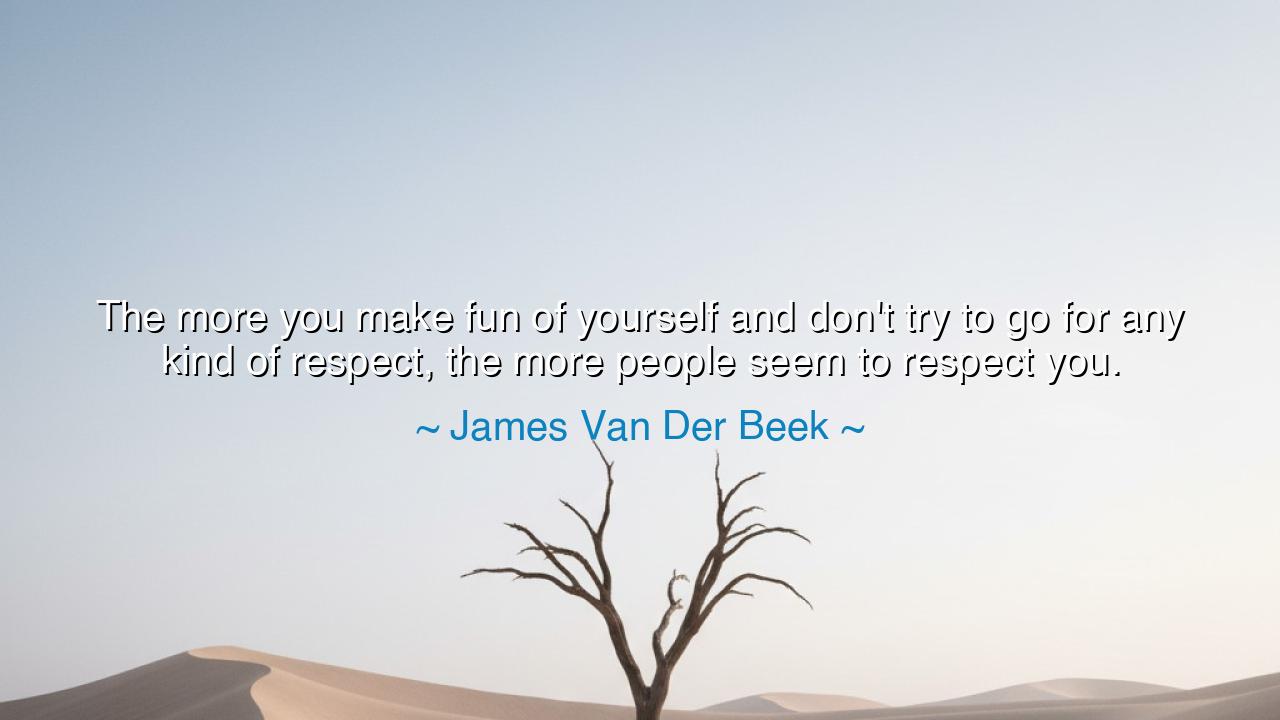
The more you make fun of yourself and don't try to go for any
The more you make fun of yourself and don't try to go for any kind of respect, the more people seem to respect you.






The words of James Van Der Beek strike with paradoxical wisdom: “The more you make fun of yourself and don’t try to go for any kind of respect, the more people seem to respect you.” At first glance, these words seem upside down, for how could mocking oneself give rise to honor? Yet within this paradox lies a truth older than kings and sages—that humility is more powerful than pride, and that those who do not chase glory often find it resting upon their shoulders.
From the ancient days, the wise knew that self-deprecation is not weakness, but strength. To laugh at oneself is to confess one’s humanity, to show the world that you are not trapped by vanity or consumed by the desperate thirst for approval. In so doing, one disarms envy, tempers hostility, and opens the hearts of others. For what soul does not feel more at ease with one who admits their flaws? Pride builds walls, but humor tears them down. Thus, the path to respect is often found not in demanding it, but in relinquishing it.
Consider the tale of Abraham Lincoln, who in the heat of political battles often turned aside bitterness with wit aimed at himself. When accused of being two-faced, he replied, “If I had another face, do you think I would wear this one?” The crowd roared with laughter, and his humility earned him not scorn, but greater reverence. His ability to make light of himself did not reduce his authority—it magnified it. For in showing that he could laugh at his imperfections, he proved he was both approachable and wise.
In contrast, those who grasp desperately for respect often find it slipping through their fingers. History offers us emperors and generals who demanded reverence, compelled praise, and cloaked themselves in false grandeur. Yet their names are often remembered with bitterness or ridicule. Respect cannot be forced, for it is not the coin of fear, but the gift of admiration freely given. And admiration blooms most naturally where humility waters the soil.
Van Der Beek’s insight reveals that humor is a bridge. By making fun of oneself, one lowers the guard of others, creating a shared humanity where connection can flourish. This is not the false modesty of those who belittle themselves for praise, but the genuine courage of one who says, “I know my faults, and I am unafraid.” Such a spirit commands respect because it is rare, for many fear exposure, while few dare to embrace it.
The lesson is clear: do not chase respect, and it will come to you. Instead, chase authenticity, laughter, and humility. Do not be afraid to stumble openly, to admit your failings, or to laugh at your own absurdities. People will not mock you more—they will love you more. For in your honesty, they see themselves, and in your laughter, they find freedom.
Practical wisdom flows from this: in your work, do not cloak your errors in pride, but confess them with good humor. In your friendships, do not seek to impress, but to connect through shared laughter. In your leadership, do not rule through intimidation, but through humility that welcomes respect without demanding it. For it is better to be honored for your honesty than feared for your pride.
Thus, the paradox stands: by not striving for respect, you may earn it in abundance. This is the secret of the wise, the joke of the humble, the treasure of those who embrace humanity as it is. Carry this truth with you always: humility is the crown that cannot be seized, only bestowed, and laughter is the key that unlocks the hearts of others.






AAdministratorAdministrator
Welcome, honored guests. Please leave a comment, we will respond soon